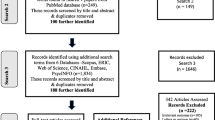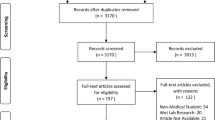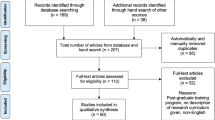Abstract
Background
Global interest in research skills in undergraduate medical education is growing. There is no consensus regarding expected research skills of medical students on graduation. We conducted a systematic review to determine the aims and intended learning outcomes (ILOs) of mandatory research components of undergraduate medical curricula incorporating the teaching, assessment, and evaluation methods of these programs.
Methods
Using the PRISMA protocol, MEDLINE and ERIC databases were searched with keywords related to “medical student research programs” for relevant articles published up until February 2020. Thematic analysis was conducted according to student experience/reactions, mentoring/career development, and knowledge/skill development.
Results
Of 4880 citations, 41 studies from 30 institutions met the inclusion criteria. Programs were project-based in 24 (80%) and coursework only–based in 6 (20%). Program aims/ILOs were stated in 24 programs (80%). Twenty-seven different aims/ILOs were identified: 19 focused on knowledge/skill development, 4 on experience/reactions, and 4 on mentoring/career development. Project-based programs aimed to provide an in-depth research experience, foster/increase research skills, and critically appraise scientific literature. Coursework-based programs aimed to foster/apply analytical skills for decision-making in healthcare and critically appraise scientific literature. Reporting of interventions was often incomplete, short term, and single institution. There was poor alignment between aims, teaching, assessment, and evaluation methods in most.
Conclusions
The diversity of teaching programs highlights challenges in defining core competencies in research skills for medical graduates. Incomplete reporting limits the evidence for effective research skills education; we recommend those designing and reporting educational interventions adopt recognized educational reporting criteria when describing their findings. Whether students learn by “doing”, “proposing to do”, or “critiquing”, good curriculum design requires constructive alignment between teaching, assessment, and evaluation methods, aims, and outcomes. Peer-reviewed publications and presentations only evaluate one aspect of the student research experience.

Similar content being viewed by others
Data Availability
The data extraction sheet used and/or analysed during the current study is available from the corresponding author on request. Data is provided in the tables and appendices and all data is based on published studies.
References
Shaw K, Holbrook A, Bourke S. Student experience of final-year undergraduate research projects: an exploration of ‘research preparedness’. Stud High Educ. 2013;38(5):711–27.
Mohrman K, Ma W, Baker D. The research university in transition: the emerging global model. Higher Educ Policy. 2008;21:5–27.
Lawson McLean A, Saunders C, Velu PP, Iredale J, Hor K, Russell CD. Twelve tips for teachers to encourage student engagement in academic medicine. Med Teacher. 2013;35(7):549–54. https://doi.org/10.3109/0142159X.2013.775412.
Mabvuure NT. Twelve tips for introducing students to research and publishing: a medical student’s perspective. Med Teacher. 2012;34(9):705–9. https://doi.org/10.3109/0142159X.2012.684915.
Ogunyemi D, Bazargan M, Norris K, Jones-Quaidoo S, Wolf K, Edelstein R, et al. The development of a mandatory medical thesis in an urban medical school. Teach Learn Med. 2005;17(4):363–9.
Overfield T, Duffy ME. Research on teaching research in the baccalaureate nursing curriculum. J Adv Nurs. 1984;9(2):189–96.
Barton JR. Academic training schemes reviewed: implications for the future development of our researchers and educators. Med Educ. 2008;42(2):164–9. https://doi.org/10.1111/j.1365-2923.2007.02978.x.
Brannan GD, Dogbey GY, McCament CL. A psychometric analysis of research perceptions in osteopathic medical education. Med Sci Educ. 2012;22:151–61. https://doi.org/10.1007/BF03341780.
Allen A. Research skills for medical students. United Kingdom: Sage Publishing; 2012.
Biggs JB. Teaching for quality learning at university: what the student does. Buckingham: Society for Research into Higher Education : Open University Press; 1999.
Havnaer AG, Chen AJ, Greenberg PB. Scholarly concentration programs and medical student research productivity: a systematic review. Perspect Med Educ. 2017;6(4):216–26. https://doi.org/10.1007/s40037-017-0328-2.
Burk-Rafel J, Mullan PB, Wagenschutz H, Pulst-Korenberg A, Skye E, Davis MM. Scholarly concentration program development: a generalizable, data-driven approach. Academic Medicine. 2016;91(11 Association of American Medical Colleges Learn Serve Lead: Proceedings of the 55th Annual Research in Medical Education Sessions):S16-S23. doi:https://doi.org/10.1097/ACM.0000000000001362.
Bierer SB, Chen HC. How to measure success: the impact of scholarly concentrations on students--a literature review. Acad Med. 2010;85(3):438–52. https://doi.org/10.1097/ACM.0b013e3181cccbd4.
Chang Y, Ramnanan CJ. A review of literature on medical students and scholarly research: experiences, attitudes, and outcomes. Acad Med. 2015;90(8):1162–73. https://doi.org/10.1097/ACM.0000000000000702.
Amgad M, Man Kin Tsui M, Liptrott SJ, Shash E. Medical student research: an integrated mixed-methods systematic review and meta-analysis. PLoS One. 2015;10(6):e0127470. https://doi.org/10.1371/journal.pone.0127470.
Agarwal N, Norrmén-Smith IO, Tomei KL, Prestigiacomo CJ, Gandhi CD. Improving medical student recruitment into neurological surgery: a single institution’s experience. World Neurosurg. 2013;80(6):745–50.
Moher D, Liberati A, Tetzlaff J, Altman D, The PRISMA Group. Preferred Reporting Items for Systematic Reviews and Meta-Analyses: The PRISMA Statement. Br Med J. 2009;339:b2535. https://doi.org/10.1136/bmj.b2535.
Riley SC, Morton J, Ray DC, Swann DG, Davidson DJ. An integrated model for developing research skills in an undergraduate medical curriculum: appraisal of an approach using student selected components. Perspect Med Educ. 2013;2(4):230–47. https://doi.org/10.1007/s40037-013-0079-7.
Drees S, Schmitzberger F, Grohmann G, Peters H. The scientific term paper at the Charité: a project report on concept, implementation, and students’ evaluation and learning. GMS J Med Educ. 2019;36(5):Doc53. https://doi.org/10.3205/zma001261.
Sawarynski K, Baxa D, Folberg R. Embarking on a journey of discovery: developing transitional skill sets through a scholarly concentration program. Teach Learn Med. 2019;31(2):195–206. https://doi.org/10.1080/10401334.2018.1490184.
Mullan J, Mansfiled K, Weston K, Rich W, Burns P, Brown C, et al. ‘Involve me and I learn’: development of an assessment program for research and critical analysis. J Med Educ Curric Dev. 2017;4:1–8. https://doi.org/10.1177/2382120517692539.
Möller R, Shoshan M. Does reality meet expectations? An analysis of medical students’ expectations and perceived learning during mandatory research projects. BMC Med Educ. 2019;19:93. https://doi.org/10.1186/s12909-019-1526-x.
Burgoyne LN, O’Flynn S, Boylan GB. Undergraduate medical research: the student perspective. Med Educ Online. 2010;10.
Devi V, Ramnarayan K, Abraham RR, Pallath V, Kamath A, Kodidela S. Short-term outcomes of a program developed to inculcate research essentials in undergraduate medical students. J Postgrad Med. 2015;61(3):163–8.
Osman T. Medical students’ perceptions towards research at a Sudanese University. BMC Med Educ. 2016;16(1):253.
Zee M, de Boer M, Jaarsma AD. Acquiring evidence-based medicine and research skills in the undergraduate medical curriculum: three different didactical formats compared. Perspect Med Educ. 2014;3(5):357–70. https://doi.org/10.1007/s40037-014-0143-y.
DiGiovanni BF, Ward DS, O’Donnell SM, Fong CT, Gross RA, Grady-Weliky T, et al. Process of discovery: a fourth-year translational science course. Med Educ Online. 2011;16.
Riegelman RK. Effects of teaching first-year medical students skills to read medical literature. J Med Educ. 1986;61(6):454–60.
Shaikh W, Patel M, Shah H, Singh S. ABC of research: experience of Indian medical undergraduates. Med Educ. 2015;49(5):523–4.
Blazer D, Bradford W, Reilly C. Duke’s 3rd year: a 35-year retrospective. Teach Learn Med. 2001;13(3):192–8. https://doi.org/10.1207/S15328015TLM1303_9.
Holloway R, Nesbit K, Bordley D, Noyes K. Teaching and evaluating first and second year medical students’ practice of evidence-based medicine. Med Educ. 2004;38(8):868–78. https://doi.org/10.1111/j.1365-2929.2004.01817.x.
Boninger M, Troen P, Green E, Borkan J, Lance-Jones C, Humphrey A, et al. Implementation of a longitudinal mentored scholarly project: an approach at two medical schools. Acad Med. 2010;85(3):429–37.
Laskowitz DT, Drucker RP, Parsonnet J, Cross PC, Gesundheit N. Engaging students in dedicated research and scholarship during medical school: the long-term experiences at Duke and Stanford. Acad Med. 2010;85(3):419–28.
Rhyne RL. A scholarly research requirement for medical students: the ultimate problem-based learning experience. Acad Med. 2000;75(5):523–4.
Rosenblatt RA, Desnick L, Corrigan C, Keerbs A. The evolution of a required research program for medical students at the University of Washington School of Medicine. Acad Med. 2006;81(10):877–81.
Crabtree EA, Brennan E, Davis A, Squires JE. Connecting education to quality: engaging medical students in the development of evidence-based clinical decision support tools. Acad Med. 2017;92(1):83–6.
Rao G, Kanter SL. Physician numeracy as the basis for an evidence-based medicine curriculum. Acad Med. 2010;85(11):1794–9.
Schor NF, Troen P, Kanter SL, Levine AS. The Scholarly Project Initiative: introducing scholarship in medicine through a longitudinal, mentored curricular program. Acad Med. 2005;80(9):824–31.
O’Connor Grochowski C, Halperin EC, Buckley EG. A curricular model for the training of physician scientists: the evolution of the Duke University School of Medicine curriculum. Acad Med. 2007;82(4):375–82. https://doi.org/10.1097/ACM.0b013e3180333575.
Dogas Z. Teaching scientific methodology at a medical school: experience from Split, Croatia. Nat Med J India. 2004;17(2):105–7.
Marusic A, Marusic M. Teaching students how to read and write science: a mandatory course on scientific research and communication in medicine. Acad Med. 2003;78(12):1235–9.
Dekker FW, Halbesma N, Zeestraten EA, Vogelpoel EM, Blees MT, de Jong PGM. Scientific training in the Leiden Medical School preclinical curriculum to prepare students for their research projects. J Int Assoc Med Sci Educ. 2009;19(2s).
Gotterer GS, O’Day D, Miller BM. The Emphasis Program: a scholarly concentrations program at Vanderbilt University School of Medicine. Acad Med. 2010;85(11):1717–24.
Houlden RL, Raja JB, Collier CP, Clark AF, Waugh JM. Medical students’ perceptions of an undergraduate research elective. Med Teacher. 2004;26(7):659–61.
Knight SE, Van Wyk JM, Mahomed S. Teaching research: a programme to develop research capacity in undergraduate medical students at the University of KwaZulu-Natal, South Africa. BMC Med Educ. 2016;16:61.
Smith FG, Harasym PH, Mandin H, Lorscheider FL. Development and evaluation of a Research Project Program for medical students at the University of Calgary Faculty of Medicine. Acad Med. 2001;76(2):189–94.
van den Akker M, Dornan T, Scherpbier AJJA, Oude Egbrink MGA, Snoeckx LHEH. Easing the transition: the final year of medical education at Maastricht University. Z Evid Fortbild Qual Gesundh Wesen. 2012;106(2):92–7.
Hunt DP, Haidet P, Coverdale JH, Richards B. The effect of using team learning in an evidence-based medicine course for medical students. Teach Learn Med. 2003;15(2):131–9.
Roland CG, Cox BG. A mandatory course in scientific writing for undergraduate medical students. J Med Educ. 1976;51(2):89–93.
Barbosa JM, Magalhaes SI, Ferreira MA. Call to publish in an undergraduate medical course: dissemination of the final-year research project. Teach Learn Med. 2016;28(4):432–8.
Dyrbye LN, Davidson LW, Cook DA. Publications and presentations resulting from required research by students at Mayo Medical School, 1976-2003. Acad Med. 2008;83(6):604–10.
McPherson JR, Mitchell MM. Experience with providing research opportunities for medical students. J Med Educ. 1984;59(11 Pt 1):865–8.
Hren D, Lukic IK, Marusic A, Vodopivec I, Vujaklija A, Hrabak M, et al. Teaching research methodology in medical schools: students’ attitudes towards and knowledge about science. Med Educ. 2004;38(1):81–6.
Vujaklija A, Hren D, Sambunjak D, Vodopivec I, Ivanis A, Marusic A, et al. Can teaching research methodology influence students’ attitude toward science? Cohort study and nonrandomized trial in a single medical school. J Investig Med. 2010;58(2):282–6.
Ebbert A Jr. A retrospective evaluation of research in the medical curriculum. J Med Educ. 1960;35:637–43.
Moller R, Shoshan M. Medical students’ research productivity and career preferences; a 2-year prospective follow-up study. BMC Med Educ. 2017;17(1):51.
Mullan JR, Weston KM, Rich WC, McLennan PL. Investigating the impact of a research-based integrated curriculum on self-perceived research experiences of medical students in community placements: a pre- and post-test analysis of three student cohorts. BMC Med Educ. 2014;14:161.
Frank JR. The CanMEDS 2005 physician competency framework: better standards, better physicians, better care. Royal College of Physicians and Surgeons of Canada: Ottawa; 2005.
Laidlaw A, Guild S, Struthers J. Graduate attributes in the disciplines of Medicine, Dentistry and Veterinary Medicine: a survey of expert opinions. BMC Med Educ. 2009;9:28. https://doi.org/10.1186/1472-6920-9-28.
Shankar PR, Chandrasekhar TS, Mishra P, Subish P. Initiating and strengthening medical student research: time to take up the gauntlet. Kathmandu Univ Med J. 2006;4(1):135–8.
Laidlaw A, Aiton J, Struthers J, Guild S. Developing research skills in medical students: AMEE Guide No. 69. Med Teacher. 2012;34(9):e754–71. https://doi.org/10.3109/0142159X.2012.704438.
Frishman WH. Student research projects and theses: should they be a requirement for medical school graduation? Heart Dis. 2001;3(3):140–4.
Parsonnet J, Gruppuso PA, Kanter SL, Boninger M. Required vs. elective research and in-depth scholarship programs in the medical student curriculum. Acad Med. 2010;85(3):405–8. https://doi.org/10.1097/ACM.0b013e3181cccdc4.
Maggio LA, Cate OT, Irby DM, O’Brien BC. Designing evidence-based medicine training to optimize the transfer of skills from the classroom to clinical practice: applying the four component instructional design model. Acad Med. 2015;90(11):1457–61. https://doi.org/10.1097/ACM.0000000000000769.
Portfolio-based learning in general practice: report of a working group on higher professional education. Royal College of General Practitioners 1993.
Friedman Ben David M, Davis MH, Harden RM, Howie PW, Ker J, Pippard MJ. AMEE Medical Education Guide No. 24: portfolios as a method of student assessment. Med Teacher. 2001;23(6):535–51.
Zier K, Stagnaro-Green A. A multifaceted program to encourage medical students’ research. Acad Med. 2001;76(7):743–7.
Kirkpatrick DL. Evaluation of Training. In: Craig RL, American Society for Training and Development, editors. Training and development handbook: a guide to human resource development. 3rd ed. New York: McGraw-Hill; 1987.
Australian Medical Council Limited. Accreditation standards for primary medical education providers and their program of study and graduate outcome statements. Graduate Outcome Statements 2012.
Liaison Committee on Medical Education. Functions and structure of a medical school. Washington, DC, USA 2017.
Haidet P, Levine RE, Parmelee DX, Crow S, Kennedy F, Kelly PA, et al. Guidelines for reporting team-based learning activities in the medical and health sciences education literature. Acad Med. 2012;87(3):292–9.
Patricio M, Juliao M, Fareleira F, Young M, Norman G, Vaz CA. A comprehensive checklist for reporting the use of OSCEs. Med Teacher. 2009;31(2):112–24.
Phillips A, Lewis L, McEvoy M, Galipeau J, Glasziou P, Moher D, et al. Development and validation of the guideline for reporting evidence-based practice educational interventions and teaching (GREET). BMC Med Educ. 2016;16:237.
Acknowledgements
We would like to acknowledge Mr Patrick Condron, from the University of Melbourne Brownless Biomedical Library, for his assistance in designing the search strategy.
Funding
This work was partly funded by a Faculty of Medicine, Dentistry and Health Sciences (University of Melbourne) Learning and Teaching Initiative Seed Funding Grant awarded to Dr Melissa Lee and Dr Justin Bilszta.
Author information
Authors and Affiliations
Contributions
MGYL and JB developed the conception, design, and methodology of the review, and searched, analysed, and interpreted the literature within the review. JB drafted the manuscript and revised its preparation for submission. JB and MGYL give permission for this version to be published and agree to be accountable for all aspects of the work. WH provided advice and consultation throughout, assisted with the analysis of the literature, and reviewed multiple draft manuscripts. WH gives permission for this version to be published and agrees to be accountable for all aspects of the work. All authors read and approved the final manuscript.
Corresponding author
Ethics declarations
Competing Interests
The authors declare that they have no competing interests.
Ethics Approval and Consent to Participate
Not applicable
Consent for Publication
Not applicable
Disclaimer
The funding body has no role in the design of the study and collection, analysis, and interpretation of data.
Additional information
Publisher’s Note
Springer Nature remains neutral with regard to jurisdictional claims in published maps and institutional affiliations.
Electronic Supplementary Material
ESM 1
(DOCX 121 kb)
Rights and permissions
About this article
Cite this article
Lee, M.G.Y., Hu, W.C.Y. & Bilszta, J.L.C. Determining Expected Research Skills of Medical Students on Graduation: a Systematic Review. Med.Sci.Educ. 30, 1465–1479 (2020). https://doi.org/10.1007/s40670-020-01059-z
Published:
Issue Date:
DOI: https://doi.org/10.1007/s40670-020-01059-z




